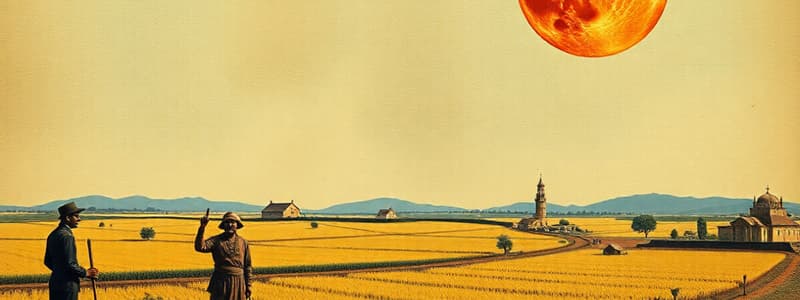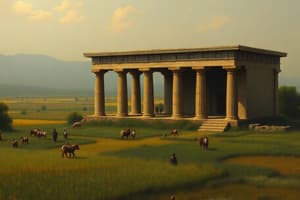Podcast
Questions and Answers
What significant agricultural development helped Mesopotamian societies flourish?
What significant agricultural development helped Mesopotamian societies flourish?
- Advanced plowing machinery
- New irrigation techniques (correct)
- Crop rotation techniques
- Use of chemical fertilizers
Which of the following is NOT one of Mesopotamia's notable firsts?
Which of the following is NOT one of Mesopotamia's notable firsts?
- First law code
- First empire
- First democratic government (correct)
- First written language
Who is recognized as the first named author in history from Mesopotamia?
Who is recognized as the first named author in history from Mesopotamia?
- Gilgamesh
- Enheduanna (correct)
- Sargon the Great
- Hammurabi
What geographical feature contributed significantly to the agriculture of Mesopotamia?
What geographical feature contributed significantly to the agriculture of Mesopotamia?
Which city-state is NOT considered part of southern Mesopotamia?
Which city-state is NOT considered part of southern Mesopotamia?
What was a major downside of the flooding of the Tigris and Euphrates Rivers?
What was a major downside of the flooding of the Tigris and Euphrates Rivers?
What staple crops were primarily cultivated in Mesopotamia?
What staple crops were primarily cultivated in Mesopotamia?
What goods did Mesopotamians primarily trade for items they could not produce locally?
What goods did Mesopotamians primarily trade for items they could not produce locally?
What role did religion play in Mesopotamian society?
What role did religion play in Mesopotamian society?
Which of the following was a function of high priests and priestesses in Mesopotamia?
Which of the following was a function of high priests and priestesses in Mesopotamia?
What was a common cause of decline in Mesopotamian empires?
What was a common cause of decline in Mesopotamian empires?
How was the social structure of Mesopotamia organized?
How was the social structure of Mesopotamia organized?
What was the primary function of cuneiform writing in Mesopotamia?
What was the primary function of cuneiform writing in Mesopotamia?
Which group occupied the highest position in the Mesopotamian social hierarchy?
Which group occupied the highest position in the Mesopotamian social hierarchy?
What significant event often led to the transformation of Mesopotamian societies?
What significant event often led to the transformation of Mesopotamian societies?
What type of writing material was primarily used by Mesopotamian scribes?
What type of writing material was primarily used by Mesopotamian scribes?
How could individuals in Mesopotamian society improve their social standing?
How could individuals in Mesopotamian society improve their social standing?
What material were Mesopotamian cylinder seals typically made from?
What material were Mesopotamian cylinder seals typically made from?
What materials were used to create the Standard of Ur?
What materials were used to create the Standard of Ur?
Which factor was crucial for the political structure of Mesopotamia?
Which factor was crucial for the political structure of Mesopotamia?
How did Sargon of Akkad maintain control over his empire?
How did Sargon of Akkad maintain control over his empire?
What disaster caused the decline of Sargon's dynasty around 2150 BCE?
What disaster caused the decline of Sargon's dynasty around 2150 BCE?
What was the primary purpose of cuneiform writing in Mesopotamia?
What was the primary purpose of cuneiform writing in Mesopotamia?
Which of the following was a contribution of Mesopotamian astronomers?
Which of the following was a contribution of Mesopotamian astronomers?
Who was the first named author known from Mesopotamian history?
Who was the first named author known from Mesopotamian history?
What significant change to timekeeping does Mesopotamia credit to its civilization?
What significant change to timekeeping does Mesopotamia credit to its civilization?
Which city was notably associated with Sargon of Akkad's political reforms?
Which city was notably associated with Sargon of Akkad's political reforms?
What was one of the main reasons for conflicts between Mesopotamian city-states?
What was one of the main reasons for conflicts between Mesopotamian city-states?
Which writing system did the Sumerians develop?
Which writing system did the Sumerians develop?
What does the Standard of Ur symbolize regarding Mesopotamian trade?
What does the Standard of Ur symbolize regarding Mesopotamian trade?
What role did Sargon's postal system play in the Akkadian Empire?
What role did Sargon's postal system play in the Akkadian Empire?
What was one of the major challenges faced by Mesopotamian rulers?
What was one of the major challenges faced by Mesopotamian rulers?
Flashcards
Mesopotamia
Mesopotamia
A region in the Middle East known for its early civilizations, located between the Tigris and Euphrates rivers. It is considered the birthplace of many "firsts" in human history, including writing, organized law, and city-states.
Sumerians
Sumerians
The people who lived in the early city-states of southern Mesopotamia, recognized for their advanced civilization and cultural contributions.
City-states
City-states
Independent and self-governing cities that developed in Mesopotamia, each with its own ruler, territory, and laws.
Irrigation Techniques
Irrigation Techniques
Signup and view all the flashcards
Fertile Crescent
Fertile Crescent
Signup and view all the flashcards
Annual Flooding
Annual Flooding
Signup and view all the flashcards
Trade in Mesopotamia
Trade in Mesopotamia
Signup and view all the flashcards
Salt Buildup
Salt Buildup
Signup and view all the flashcards
Cuneiform
Cuneiform
Signup and view all the flashcards
Cylinder Seals
Cylinder Seals
Signup and view all the flashcards
Ziggurat
Ziggurat
Signup and view all the flashcards
Social Hierarchy in Mesopotamia
Social Hierarchy in Mesopotamia
Signup and view all the flashcards
Enheduanna
Enheduanna
Signup and view all the flashcards
Mesopotamian Society: Gender Roles
Mesopotamian Society: Gender Roles
Signup and view all the flashcards
Mesopotamian Empires
Mesopotamian Empires
Signup and view all the flashcards
Decline of Mesopotamian Empires
Decline of Mesopotamian Empires
Signup and view all the flashcards
Impact of Irrigation on Mesopotamian Society
Impact of Irrigation on Mesopotamian Society
Signup and view all the flashcards
Alexander the Great's Influence on Mesopotamia
Alexander the Great's Influence on Mesopotamia
Signup and view all the flashcards
Standard of Ur
Standard of Ur
Signup and view all the flashcards
Mesopotamian Trade Networks
Mesopotamian Trade Networks
Signup and view all the flashcards
Fertile Soil in Mesopotamia
Fertile Soil in Mesopotamia
Signup and view all the flashcards
Role of Mesopotamian Rulers
Role of Mesopotamian Rulers
Signup and view all the flashcards
Conflicts in Mesopotamia
Conflicts in Mesopotamia
Signup and view all the flashcards
Sargon of Akkad
Sargon of Akkad
Signup and view all the flashcards
Akkadian Empire Reforms
Akkadian Empire Reforms
Signup and view all the flashcards
Sargon’s Daughter Enheduanna
Sargon’s Daughter Enheduanna
Signup and view all the flashcards
Cuneiform Writing
Cuneiform Writing
Signup and view all the flashcards
Importance of Clay Tablets
Importance of Clay Tablets
Signup and view all the flashcards
The Epic of Gilgamesh
The Epic of Gilgamesh
Signup and view all the flashcards
Mesopotamian Astronomy
Mesopotamian Astronomy
Signup and view all the flashcards
Mesopotamian Geometry
Mesopotamian Geometry
Signup and view all the flashcards
Study Notes
Mesopotamia: The Land of Firsts
- Mesopotamia, located between the Tigris and Euphrates Rivers, developed some of the world's earliest complex agricultural societies.
- This region saw the rise of the first empire, the first written language (cuneiform), and the first law code.
- Enheduanna, a high priestess, poet, and daughter of Sargon, was the first named author in history.
- Mesopotamian city-states, including Eridu, Ur, and Uruk, emerged in southern Mesopotamia around 3800 BCE. These city-states were collectively known as Sumeria.
- Northern Mesopotamia was known as Akkad.
- The region's fertile soil, resulting from annual river flooding, supported agriculture, making it a desirable place to live.
- Early irrigation and canal systems allowed for larger farms and the cultivation of staple crops such as wheat and barley.
- The unpredictability of flooding and the buildup of salt in the soil were persistent challenges to Mesopotamian agriculture.
Geography and Environment
- The Tigris and Euphrates Rivers flow from the Zagros Mountains to the Persian Gulf.
- Mesopotamia's relatively flat and semi-arid terrain was prone to flooding.
- Flooding, paired with irrigation, allowed for larger and more successful farms.
- Surplus crops facilitated trade and exchange with neighbouring societies for needed resources.
- Materials like metals, wood, and lapis lazuli were traded for Mesopotamian goods.
- The Standard of Ur is a significant artefact that demonstrates the extensive trade networks in the region.
Political Structure
- Political power in Mesopotamian city-states was closely linked to the environment and agriculture.
- Rulers were often kings who claimed divine authority.
- Conflicts arose over access to water and land.
- Sargon of Akkad created the first standing army and postal system, and standardized weights and measures. He also appointed his daughter Enheduanna as a high priestess.
- The Akkadian Empire expanded from the Mediterranean Sea to the Persian Gulf.
- The empire faced rebellions and eventually fell after Sargon's death due to a combination of internal issues and external conflicts.
Culture
- Writing developed in Mesopotamia around 3400 BCE using cuneiform script on clay tablets.
- The Epic of Gilgamesh, an epic poem, was written in Akkadian.
- Enheduanna, famed for her poetry (dedicated to gods and goddesses), is recognized as the first named author.
- Mesopotamians used geometry for land surveying.
- They made significant strides in astronomy, including naming planets and predicting eclipses and developing the calendar system.
- Mesopotamian scribes utilized cylinder seals for authentication and message conveyance.
- Cuneiform tablets and cylinder seals offer invaluable insight into Mesopotamian life, culture, and records.
Society
- Mesopotamian society was hierarchical, with religion playing a significant role in daily life.
- Kings, nobles, priests, and priestesses were at the top of the social pyramid.
- Lower classes and enslaved people were at the bottom of the pyramid.
- Enheduanna, the first named author and high priestess and her counterparts held temple roles.
- The ziggurat was a prominent Mesopotamian temple, most notably the one in Ur.
- Mesopotamian society was also divided on gender lines, with some women holding positions of power.
Decline and Transformation
- Mesopotamia transitioned from independent city-states to a series of empires (Akkadian, Babylonian, Assyrian, Persian).
- Frequent invasions were a common occurrence due to the lack of natural barriers and internal political conflicts.
- Environmental factors also contributed to the region's decline, such as unpredictable flooding and soil salinity, causing crop failures and famines.
- The combination of poor environmental conditions and political instability eventually led to the decline of Mesopotamian empires.
- Alexander the Great's empire encompassed Mesopotamia by 331 BCE.
Studying That Suits You
Use AI to generate personalized quizzes and flashcards to suit your learning preferences.




